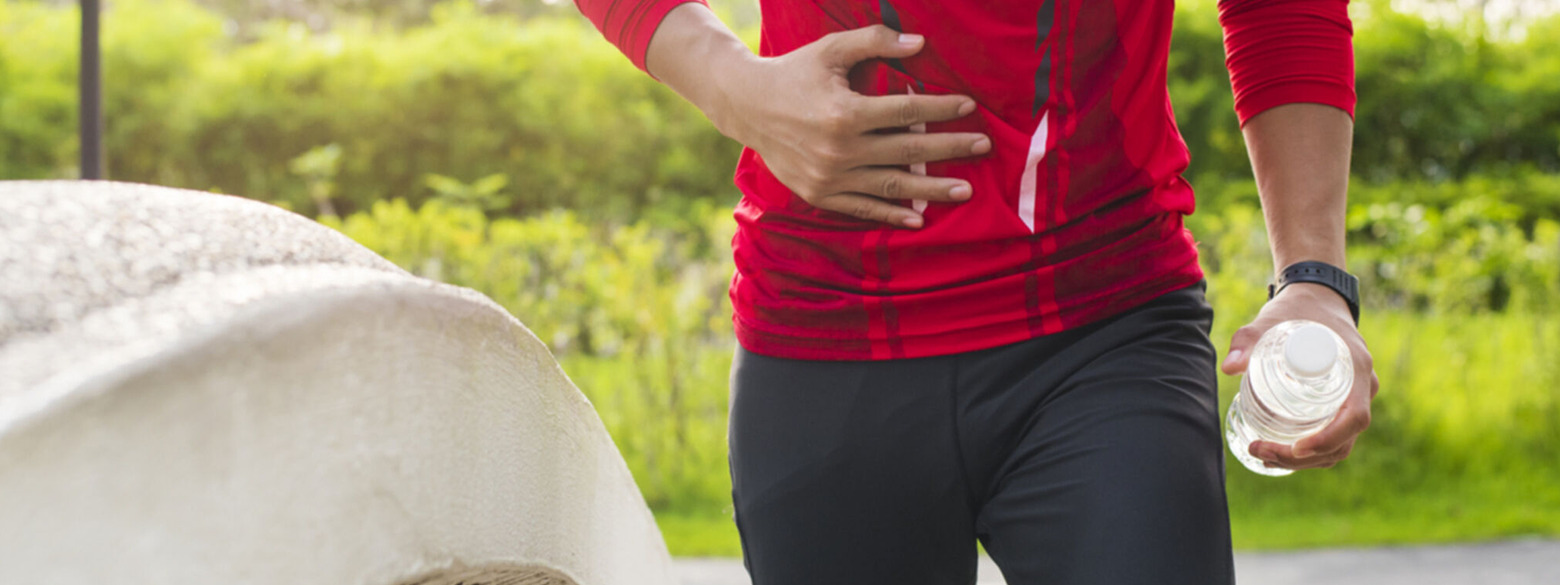How to avoid gastrointestinal complaints during exercise?
Thursday 14 January 2021

Do you often suffer from gastrointestinal complaints before or during exercise? In the blog post below, sports doctor Dr. Chris Goossens elaborates on the different causes of gastrointestinal complaints in athletes.

Chris Goossens – Sports doctor
Gastrointestinal complaints during exercise occur frequently in athletes and are a common reason why a match or race didn't go as planned. It is estimated that 30 to 50% of athletes experience gastrointestinal complaints during and after exercise. Endurance athletes in particular often have this problem and especially long-distance runners and triathletes. For triathletes, gastro-intestinal complaints can arise in any phase of a triathlon, but they occur more frequently in the running section, because it takes place later in the race and is the most demanding part of the three. The most frequent symptoms are abdominal pain, nausea, burning stomach acid, abdominal cramps, increased flatulence, loose stools, diarrhoea and vomiting.
The causes of gastrointestinal symptoms are not yet fully understood. The symptoms are hard to research because they are often specific to competition situations and are very hard to reproduce or simulate in laboratory tests. The causes of gastrointestinal symptoms can generally be divided into 3 categories:
Physiological Causes
During exercise the blood is redistributed; 20-30% more blood flows to the muscles at the expense of the gastrointestinal tract. Consequently, intestinal ischemia occurs (i.e. insufficient blood flow), which is a major cause of gastrointestinal discomfort. Ischemic Colitis (i.e. reduced blood flow to the intestines) is well-known in the sports world.
Such a low blood supply can affect intestinal function and can result in common gastrointestinal complaints such as abdominal cramps. This mainly occurs in endurance athletes who exert themselves beyond their physical capabilities. This can cause any athlete to suffer from gastrointestinal complaints and the local football leagues are a great example of this. In these football leagues some footballers might not have done any exercise in the 6-week break. Then, they over-exert themselves on the first training session and occasionally even vomit at the side of the pitch.
In addition, stress affects hormone secretion which can in turn affect gastrointestinal blood flow. As with exams, a lot of athletes experience stress before the start of a competition, which means that some athletes have to go to the toilet frequently just before a competition. This is often related to a person's mental state and we see that older athletes suffer from it less.
Mechanical causes
Gastrointestinal discomfort with a mechanical cause is either related to the impact of a particular exercise or to the posture when exercising. In particular, long-distance runners suffer from impact related The mechanical, rhythmic jolts to the gut while running, can cause small gastrointestinal bleeds. This damages the intestinal wall and can cause discomfort such as flatulence or diarrhoea (also known as runner's trots). In this situation, such symptoms usually have very little to do with ischemia because long-distance runners often train by doing low-intensity exercise. Consequently, it is also not evident how to avoid this. The longer the distance, the greater the chance of gastrointestinal complaints. Digestive supplements could be taken in preparation for a long-distance run, but they offer no guarantees whatsoever for avoiding gastrointestinal complaints.
A person's posture during exercise also has a major effect on gastrointestinal symptoms. For example, these symptoms are frequently experienced on a bike (in particular in the aero position) as a result of increased pressure on the stomach. This means the food consumed is not digested properly. The last Bordeaux-Paris race in 1988, with a total distance of 618 km, is a perfect example of this. During this race, professional cyclists stayed in the same position while cycling for over 18 hours on end. In the last 100 km, a lot of the cyclists suffered from diarrhoea and some even had to end the race prematurely as a result. Regularly changing your position on a bike can often relieve gastrointestinal complaints. On the other hand, taking a good, well-balanced probiotic in the preparation period before a race could certainly be beneficial in terms of prevention.
Nutritional causes
Finally, food can have a big influence on gastrointestinal complaints. A lot of athletes have an unbalanced diet which doesn't aid digestion. In the days before an important competition it is advisable to limit foods/nutrients that could aggravate/over-stimulate the gut, such as fibre, dairy products, fructose etc. Better yet, in the last 24 hours before the start of the competition, it is best to avoid these foods altogether.
Avoid fibre-rich foods
Avoid fibre-rich foods on the day of or even in the days before a race or an important training session. For an athlete, in the preparation period a diet with sufficient fibre will help to maintain a healthy gastrointestinal function and balance. Fibre intake on the day of a competition is another story however. Fibre is by definition indigestible, it can stimulate digestion and gas formation and cause abdominal pain. Consequently, on the day of a competition opt for processed white foods, such as white pasta, white rice and white bread instead of wholemeal bread, fibre-rich cereals, oats and brown rice. Check food labels for fibre content. Also, most vegetables and fruit are rich in fibres, but there are a few exceptions: courgettes, tomatoes, olives, grapes and grapefruit all contain less than one gram of fibre per portion and can therefore be eaten as part of a low-fibre diet.
Avoid milk products
Avoid milk products that contain lactose, because even mild lactose-intolerance can cause problems when exercising. A lot of athletes are lactose intolerant without knowing it. Soy milk, rice milk or almond milk do not generally contain any lactose and are therefore possible alternatives.
Avoid foods that are rich in fructose
Avoid fructose-rich foods (especially drinks that only contain fructose). Fructose doesn't just occur in fruit, but also in most processed sweets and biscuits, in the form of glucose-fructose syrup. Fructose is absorbed more slowly by the intestines than glucose and is less well tolerated. Drinks that contain a combination of fructose, glucose and/or maltodextrins are reasonably well-digested as a rule and can even improve tolerance.
Avoid hypertonic drinks during exercise
Drinks with a high density (osmolarity> 500 mOsm/L) can cause gastrointestinal complaints. These highly-concentrated, hypertonic drinks usually contain more than 12 g of carbohydrates per 100 ml liquid and slow down gastric emptying. The big disadvantage of these drinks it that they are absorbed into the bloodstream less quickly and can therefore lead to gastrointestinal discomfort. During exercise, drink isotonic drinks as much as possible, as these are known not to cause any gastrointestinal discomfort and to contribute to a good fluid balance.
Avoid taking aspirin and non-steroidal anti-inflammatory drugs (NSAIDs)
Avoid taking aspirin and non-steroidal anti-inflammatory drugs (NSAIDs) such as ibuprofen. It has been generally proven that both aspirin and NSAIDs increase intestinal permeability and that they can increase gastrointestinal complaints. The use of NSAIDs in the run up to a competition should therefore be avoided.
Avoid dehydration
Because dehydration can worsen gastrointestinal symptoms, it is important to avoid becoming dehydrated. So, ensure you are well-hydrated at the start of the competition and strive for as colourless urine as possible.
Practise new nutritional strategies
Before an important competition make sure you have tested out your diet to be eaten on the competition day (and possibly on the days before as well). That way you can discover what does and doesn't work for you and reduce the risk of gastrointestinal problems disrupting your competition.
Train your gut
Training your gut is important. Once your gut has become accustomed to the food that you will consume during a competition you will have less chance of gastrointestinal problems. If you always avoid carbohydrates in your daily life, your intestines will be less able to digest carbohydrates efficiently when exercising. As a result, come competition day, you may not be able to make optimum use of all the carbohydrates you have ingested, which could lead to gastrointestinal problems. You therefore shouldn't limit your daily intake of carbohydrates, instead you should train your intestines and eat carbohydrates regularly.
So, there are various causes that can lead to gastrointestinal complaints. Moreover, everyone is different which makes it impossible to avoid 100% of gastrointestinal complaints using certain interventions. Naturally, you can try to reduce the risk as much as possible. That is why it is advisable for athletes who are susceptible to gastrointestinal complaints and athletes who rarely experience symptoms, to use a preventative probiotic in preparation for an important competition. Probiotics have a positive effect on the digestive process, they restore the balance between the pathogenic (disease causing) bacteria and the essential gut bacteria and improve immunity. An effective and balanced probiotic is characterised by a large and diverse range of bacteria and will contain a minimum of 10 billion living bacteria.
Conclusion: A balanced gastrointestinal flora is worth its weight in gold for athletes.
References:
- Colbey, Cox, Pyne, Zhang, Cripps, West 2018. Upper respiratory symptoms, gut health and mucosal immunity in athletes. Sports Med 48: S65-S77.
- Gleeson, Bishop, Oliveira, Tauler 2010. Daily probiotic’s (L casei Shirota) reduction of infection incidence in athletes. Int J of Sport Nutr and Exerc Metabol: 1-10.
- Gleeson 2016. Immunological aspects of sport nutrition. Immunology and Cell Biology 94: 117-123.
- Erick P. (2016) Runner’s diarrhea: What is it, what causes it, and how can it be prevented?
- King S, Glanville J, Sanders M, Fitzgerald A and Varley D (2014) Effectiveness of probiotics on the duration of illness in healthy children and adults who develop common acute respiratory infectious conditions: a systematic review and meta-analysis. British Journal of Nutrition 112:41-54.
- mysportscience.com
- Prado de Oliveira, Burini 2011. Food-dependent, exercise-induced gastrointestinal distress. J of the International Society of Sports Nutrition 8: 12.
- Smarkusz, Ostrowska, Witczak-Sawczuk 2017. Probiotic strains as the element of nutritional profile in physical activity – new trend or better sports results? Rocz Panstw Zakl Hig 68: 229-235.
- Nutritional supplements in sport, exercise and health – an A-Z guide. Castell, Stear and Burke 2015.p 214-216.
Sign up for our newsletter and receive a 15% discount in your mailbox
Search



